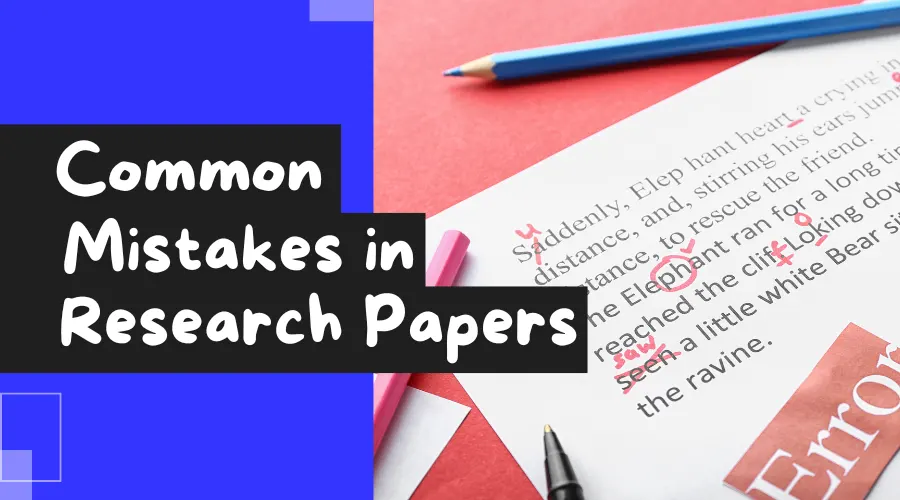Are you a new researcher wondering about common research mistakes? Today’s article will be an excellent source of information.
I and all the members of my resources team have made mistakes in their work, which I will discuss here. If you are new to research, you will get a clear idea of what you should and shouldn’t do. Our primary focus will be on common mistakes, so let’s begin.
Top Common Mistakes In Research Papers
1. Unclear Research Question or Hypothesis:
When you start a research project, you need a clear idea of what you’re trying to discover. It is your research question or hypothesis.
A common mistake our new researchers make is to keep the research question vague. They should remember that a well-defined research question or hypothesis is the foundation of a research paper. When this is clear, it will give you direction and focus for your research.
If you formulate your hypothesis correctly, you may collect relevant data, failing to solve your research objectives.
Understand then that you need a clear statement of research questions or hypotheses for literature review, data analysis, methodology, and interpretation of results. So, take your time to make it crystal clear.
2. Poor Literature Review:
Before you start your research, seeing what others have already found out is essential. It is called a literature review. It’s like reading up on what’s already been said before you add your voice.
But don’t just list what others have said—talk about how it fits with what you want to study. Also, look for gaps in knowledge that your research can fill.
Novice researchers need to remember that a literature review situates the research within an existing body of knowledge. It also identifies gaps in the existing body of knowledge and provides context.
3. Inadequate Methodology Description:
The “how” of your research is super important. Your methodology is like a recipe—it tells others exactly how you did your research so they can follow along.
Be clear about how you gathered your data and what tools you used. This will help others know if they can trust your results.
4. Misinterpretation of Results:
Your results are what you found out from doing your research. But it’s essential to stick to what your data shows. Please refrain from making guesses or saying your results mean something they don’t. Think of it like telling a story—stick to the facts!
5. Neglecting Ethical Considerations:
Sometimes, research involves real people, and treating them right is essential. Always ask permission from the people you’re studying and ensure they know what’s happening. Also, think about anything that might hurt them or make them uncomfortable.
6. Poor Writing and Presentation:
Imagine your research paper is a storybook. You want it to be easy to read and look nice. Use simple words, check for mistakes, and ensure it’s neat.
7. Inadequate Data Analysis:
When you’re done collecting data, you must make sense of it. This is where data analysis comes in. Be sure you use the appropriate instruments(tools) and techniques. And be clear about how you did it so others can understand and trust your results.
8. Ignoring Peer Review Feedback:
Sharing your work with other experts is a great way to improve it. Take heed of their advice and consider how you may do better. It’s like having friends read your story and give you ideas to make it even more enjoyable.
9. Plagiarism:
Copying someone else’s work and saying it’s yours is a big no-no. Always give credit to the people who did the job before you. It’s like being honest and saying where you got your ideas from.
10. Lack of Reproducibility:
If your research is like a recipe, it should be easy for others to follow and get the same results. Make sure you explain everything clearly so that if someone else tries your research, they can do it the same way. Transparency is key!
Common Mistakes In Research Papers Frequently Asked Questions
A research question is like the central puzzle you’re trying to solve with your research. It must be crystal clear because it guides everything you do in your study. If it’s vague or fuzzy, it’s like trying to find your way in the dark—you’ll get lost!
Reading other research papers is like checking out the map before you go on a trip. It helps you see what others have discovered so you stay calm. Plus, it can give you ideas and show you where there are gaps in knowledge that your study can fill.
Your methodology is like the recipe for your study—it tells others exactly how you did your research. Clarifying it is essential because it helps others understand and trust your results. It’s like showing them the steps to follow and see if they get the same results.
Conclusion
We all know that research is a challenging task. However, you must use Common Mistakes In Research Papers to complete the research tasks intelligently. Be aware of this.
Most of those who come to do fresh research want to do something short or get quick results. It needs to be corrected. You must be patient and aware of exactly where it could go wrong. For that, you should read our ten points again and be aware.
Related Reads:

